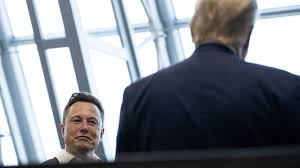Nishtha Gautam
“Why harp on the facts, it’s the exaggerations that makes a tale interesting!” A favourite aunt once exclaimed when I tried to fact-check a funny family story she was narrating to a huge, giggling audience two decades ago. Each member of my clan cheered her on and it was the start of a delightful evening.
Donald Trump’s interview with Elon Musk sent me back in time as I waded through the conversation. Both Trump and Musk know the importance of exaggerations in any narrative. The Indic epic poets knew it. Herodotus knew it. And so did Boccaccio, Chaucer, and Shakespeare. Trump’s exaggerations, ably supported by his interviewer, made for a good story for his supporters. All 60 million of them he thought were tuned into the live broadcast. This number is an exaggeration, too.
A Risk Worth Taking
But why does Trump exaggerate all the time despite a bevvy of fact-checkers waiting to give each syllable uttered by him a hang-draw-quarter treatment? Political storytelling is assessed under different rubrics than literary texts. Is this a risk worth taking? The answer is a resounding yes.
Trump capitalises on narcissism when he indulges in making outlandish claims. To understand this link better, let’s look at what the experts have to say about narcissism. “For the narcissistically involved person, there is only one reality: that of his own thought processes, feelings and needs. The world outside is not experienced or perceived objectively, i.e., as existing in its own terms, conditions and needs,” Erich Fromm proposed in the 1950s. Fromm also posited that narcissists have a stronger sense of entitlement. This lays bare the reasons behind Trump’s constant resort to exaggerations.
Narcissism And Politics
All politicians are narcissistic in some measure; this trait allows them to, first, enter politics, and then stay in it. Narcissism, however, has a highly specialised function for certain political ideologies. The interlinkages of narcissism with the sense of entitlement are important to understand while analysing why Trump’s narcissism works for him politically. A study conducted by political scientists Peter K. Hatemi and Zoltân Fazekas found that “In the 2016 election, higher entitlement reflected the mood of the general public, certainly among the working class, which voted Republican in greater numbers”. Hatemi and Fazekas propose that narcissism may have a role to play in the rise of populist politics. Trump’s constituents and those curious about him are offered a blanket of familiarity.
In simple terms, Trump’s worldview, presented with an exaggerated sense of self-importance and confidence, wins people over. People who are ever so anxious about their entitlements being eroded. And this is why statements like the following work: “Our crime rate’s going through the roof.” Who cares whether the FBI’s reports show a consistent decline in crime levels since 2020, his last presidential year? Add to it a provocative claim about Kamala Harris, “She wants to release all the prisoners that are in detention, and some of these guys are really bad. That just came out today” and you have successfully created a sense of impending doom.
Trump, The Rescuer
Trump is relying on honest Americans to believe that their entitlements are being eaten away by outsiders. Thus, he makes exaggerated claims like, “You have millions of people coming in a month” and “I believe it’s over 20 million people came into our country” about illegal immigrants. He wants people to believe that they are living under extraordinary circumstances by saying, “I think we have the worst inflation we’ve had in 100 years. They say it’s 48 years, I don’t believe it”. Shrinking entitlements being further nibbled on by outsiders-which one of us, narcissist or not, would find that desirable?
People need to despair for the narcissist to, then, brandishing his exaggerated belief in self, come in for the rescue. Trump wants people to believe that he, and only he, can solve these crises. Just the way only he could “solve” the Iran and China crises for the United States. “Iran was broke because I told China, ‘If you buy from Iran…’ Oil, it’s all about the oil, that’s where the money is. ‘…If you buy oil from Iran, you’re not going to do any business with the United States.’ And I meant it, and they said, ‘We’ll pass,’ and they didn’t buy oil.” America can be made great again only when it is unequivocally established that it is in ruins. And it can be made great again only by Trump.
Trump’s conversation with Musk, therefore, needs to be seen not as a “rambling” one which has significantly undermined his presidential prospects but as a tested strategy aimed at his constituents and swing voters. Whether it will fetch him a repeat of the 2016 outcome remains to be seen.
Till then, let’s get lost in the meandering world of storytelling.



